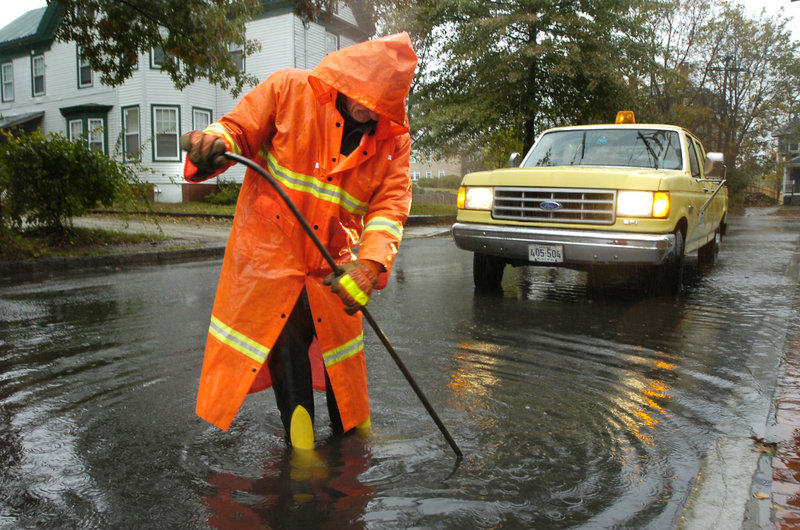PORTLAND — After nearly two decades, city engineers feel they’ve hit on a good solution to the problem of combined sewer overflows, which is what happens when big storms overwhelm the city’s wastewater system.
The city has been operating under a consent agreement with the Department of Environmental Protection since 1991, when federal regulators ordered Portland to fix a system that allowed raw sewage to flush into Casco Bay, Portland Harbor, Back Cove and streams and rivers around the city when heavy rain exceeded the capacity of sewers.
The problem was that the city’s storm and sanitary systems were integrated: Water running off the streets would be routed into regular sewer lines and then would flow to the city’s wastewater treatment plant on the Eastern Promenade to be filtered, cleaned and discharged.
If the combined flow became too heavy — during a prolonged, heavy rain, for instance — several relief points in the system allowed untreated water to flow into nearby bodies of water.
The city’s initial agreement with the DEP called for those systems to be separated, so that storm water flowed in its own pipes and was kept separate from sanitary sewers.
But heavy rain that was too much for the storm sewers could still wash into nearby bodies of water, said Kathi Earley, the city’s engineer, and that runoff also carried some undesirable material with it — road salt, gas, oil and garbage, for example.
The new approach, Earley said, is to expand the capacity of the sewer system through the use of what she calls “storage conduits” — large concrete sections that will greatly increase the amount of water and waste the system can hold.
Earley said the storage conduits would essentially be able to hold the first inch of rain along with normal amounts of sanitary sewage and feed it to the wastewater treatment plant, preventing at least some of the overflows.
Portland gets an average of about 60 significant rainfalls each year, Earley said. About 15 of those dump more than an inch of water, so the new system should immediately cut overflows by 75 percent.
Even more important, “it would capture the first flush,” she said — from the roads, not homes and businesses — which tends to contain more of the pollutants such as salt and oil that engineers would like to keep from washing into the water.
Economically, the solution is cheaper than creating separate storm sewers, easing the bite of rising sewer rates, although they are still expected to triple, from about $425 a year currently to about $1,200 annually, in the next 25 years.
Separating storm water and sanitary pipes was expected to cost about $525 million, spread out from the time the consent decree was signed to when the overall project was expected to be completed in 2040. The new approach, Earley said, will cost about $180 million over that period.
Earley said the city has access to a revolving state loan fund, financed by bonds, to draw on to finance the first phase, in which 4,000 feet of the storage conduits will be installed under Baxter Boulevard around the Back Cove. Assuming the project stays on schedule, she said, that work could get started in late 2011 or early 2012.
There are also some other pieces to the new approach, Earley said, including continuing to separate storm and sewer pipes in some areas where the storage conduits aren’t feasible and using some green approaches, such as landscaping to allow more water to be soaked up by the ground, and porous road surfaces that minimize runoff, an approach that results in less water going into storm sewers.
The Portland City Council was briefed on the approach last month and will be asked today to pass a resolution to endorse the plan, a move that will allow the city to go to the Maine DEP for approval. The federal DEP several years ago transferred oversight of the consent agreement to the state agency.
Portland Mayor Nicholos Mavadones said he doesn’t know of any opposition to the proposal on the council and said most questions were probably answered in a November workshop run by Earley.
“This would save some money and perhaps be a better alternative,” he said. “The concept seems to make sense.”
Staff Writer Edward D. Murphy can be contacted at 791-6465 or at:
emurphy@pressherald.com
Send questions/comments to the editors.




Success. Please wait for the page to reload. If the page does not reload within 5 seconds, please refresh the page.
Enter your email and password to access comments.
Hi, to comment on stories you must . This profile is in addition to your subscription and website login.
Already have a commenting profile? .
Invalid username/password.
Please check your email to confirm and complete your registration.
Only subscribers are eligible to post comments. Please subscribe or login first for digital access. Here’s why.
Use the form below to reset your password. When you've submitted your account email, we will send an email with a reset code.